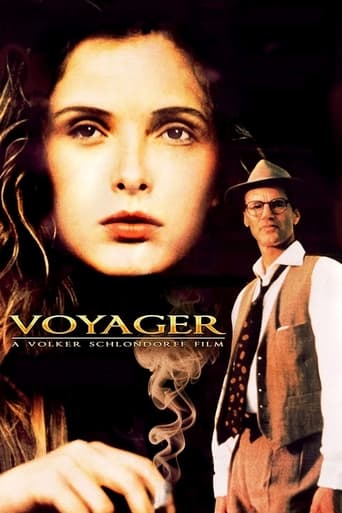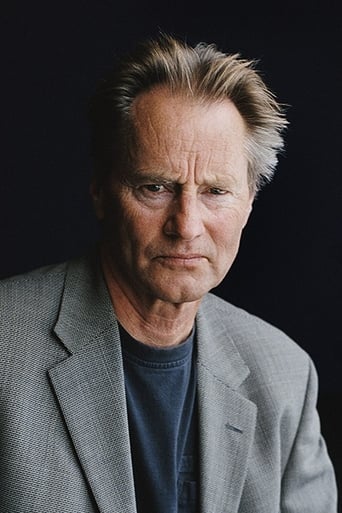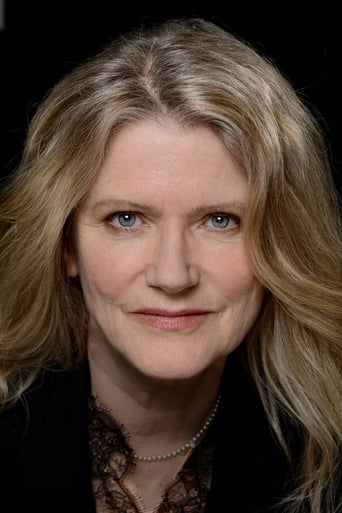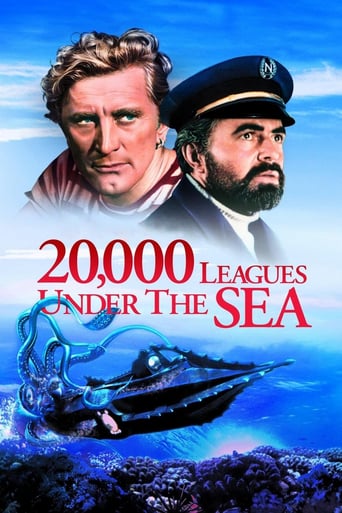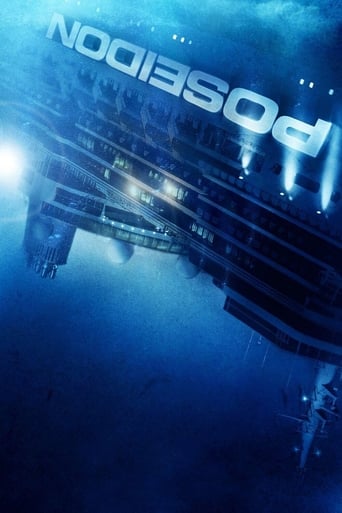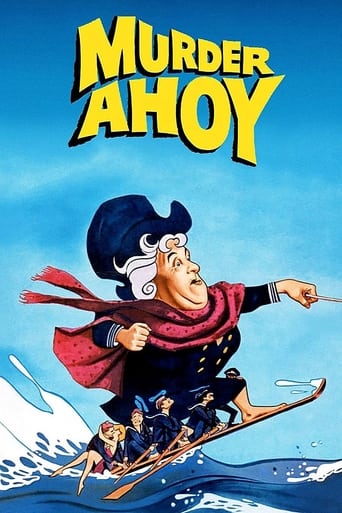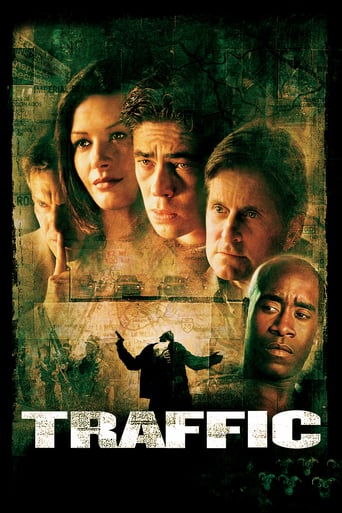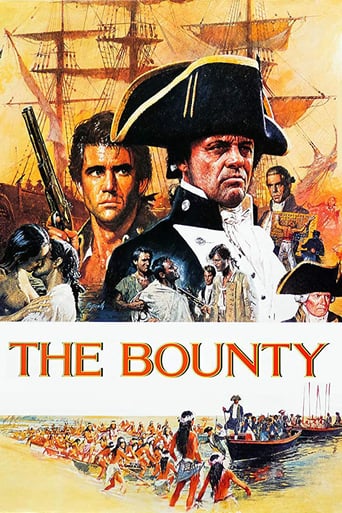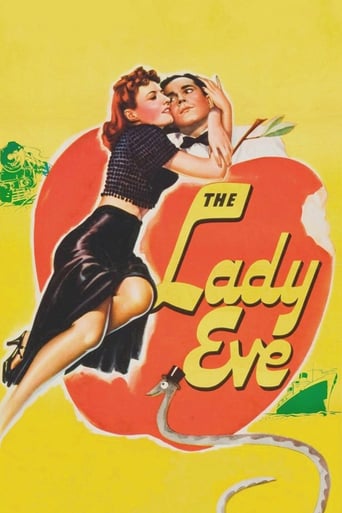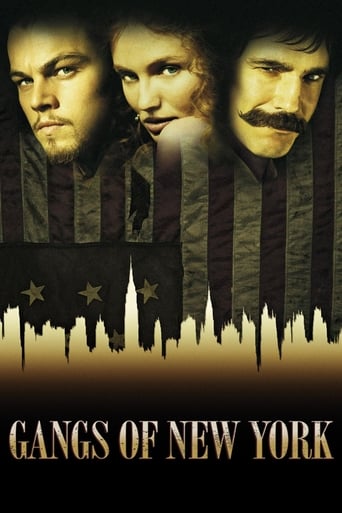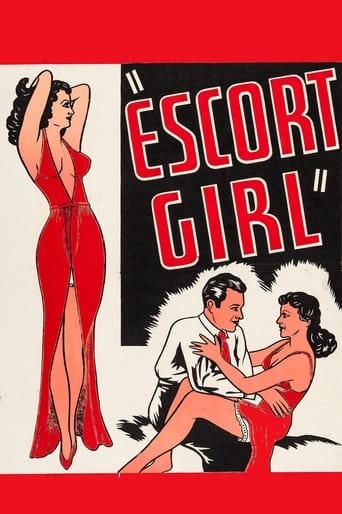Voyager (1991)
Walter Faber has survived a crash with an airplane. His next trip is by ship. On board this ship he meets the enchanting Sabeth and they have a passionate love affair. Together they travel to her home in Greece, but the rational Faber doesn't know what fate has in mind for him for past doings.
Watch Trailer
Cast


Similar titles
Reviews
So much average
Absolutely the worst movie.
It's simply great fun, a winsome film and an occasionally over-the-top luxury fantasy that never flags.
This is one of the best movies I’ve seen in a very long time. You have to go and see this on the big screen.
As many German-speaking students know, Max Frisch's "Homo Faber" is standard literature in classes, and rightly so. It is one of the rare novels that profoundly show the transformation of an extreme type of person and creed:Homo Faber, the man as the forger of his own fate, the believer in machines, technology and reason, filled with disgust towards all nature and "mushy" things like relationships, who rejects all signs and omens, finally has the bliss to get to know love and the fate to lose it.None of the subtleties, deep characterization and symbolism of Frisch's novel survived in this movie - and Julie Delpy's sweet performance was not enough to make it at least half worthwhile. - Movie not recommended (read the book).
The Voyager is in fact a drama that happens to use the novel Homo Faber by Max Frisch as its backdrop. The director picked the main three characters and boiled down the plot to its essence which takes the viewer on a globe spanning journey of coincidences and places its main protagonist Walter Faber who is an engineer who doesn't believe in fate squarely in front of his past and down a spiral to the destruction of the life of his own daughter. Certain aspects of the movie come across as far fetched because the viewer cannot benefit from the additional information available to the reader of the book. On the other hand the movie brings across the immediacy of the tragic events much closer to home and resonate with a receptive audience. The novel and this movie try to show that life cannot be reduced to a simple formula and that the mind is not equipped to deal with the matters of the heart. In that the Voyager succeeds in translating the core of the plot. Students of the novel will of course be disappointed because the director had to cut out many scenes and aspects of the book. With that in mind we are still left with a movie that should get some emotions flowing.
The only other Schlöndorff movie I was aware of having seen before this was Palmetto, a hyper-twisty neo-noir made in the States . I liked that movie a whole lot, but it didn't prepare me for Homo Faber which is very dense, well made and literary. Definitely not the "man with hot pants" type of neo noir, like Palmetto, The Hot Spot, Body Heat, Romeo is Bleeding &c. Indeed it's not that obviously noir, because it's steers free of many of the cycle's clichés, whilst keeping what is perhaps the essential ingredient: fatalism, wherein an initial mistake spirals out of control and controls your destiny. The film is not conceptual film noir, it doesn't wallow in the plot arc, or the destruction of a character. The only film I feel I can truly compare it to is the English Patient. Both movies have romantic themes, have extremely good literary-based scripts, contain educated well-spoken protagonists, excellent location shooting, unobtrusive period recreation, and take place in eras not too far apart in time.So Homo Faber is a man, Walter Faber, a prodigal engineer, who seems like a laid back cross between Fitzcarraldo and Brunel. He's too caught up in his romance with engineering to seize the moment and the girl. He is reminiscent in this sense of Dominic in Youth Without Youth, and Zetterstrøm in Allegro (excellent films), both love-blind men caught up in their pursuits (linguistics and piano playing). As Cupid is the real God and reigns over drama, these men must be punished.Homo Faber is Latin for The Man Who Forges His Own Destiny, which is ironic, because in the film Faber is subject to a series of extremely rare coincidences, seemingly manipulated by Providence. There's a duality though, because in a very real sense he has forged his own destiny, it's just that it's inescapable.The movie is a luscious wonder, it takes place all over the world in often exotic locations, and the recreation of late 50s period details works really well (there are far too many "look at me" type films where the production team feel the need to introduce absolutely superfluous period details). I mentioned the phrase "the passage of independents", in my title, which needs explaining. You come across many characters in the movie who are independent. Even when Faber is in love and travelling in Europe, quite often he will go off on his own, or she will go off on her own. The folks here are extremely insulated from the manipulations of others. Faber even has the annoying habit of ignoring questions put to him. I think the movie is very ambivalent on the subject of independence, which is displayed as being quite heartless, however on the other hand, you can see, for example, that if Faber had maintained his cloying New York relationship, that would clearly have been the wrong move. So the film allows you to make up your own mind on that subject, and really in the process becomes elegiac.To be more forthright on the subject, the film may indeed be best described as being about the folly of existentialism. Although as mentioned there is a large level of ambiguity to this. Faber, the "intellectual Philistine", at one point draws a blank when Sabeth mentions Camus and his existentialist (although Camus rejected this term) novel The Stranger, and then makes a joke when Sabeth asks him if he knows about Sartre and existentialism, "aren't those the guys who dress in black and drink espresso" (quote from memory). This is despite him being what I would describe as a textbook existentialist himself. He is an authentic person, full of enthusiasm for his own interests, who lives for himself, whilst recognising his level of duty, and its strict limits. When he truly starts to understand love, and, although he feels absolutely nothing in the presence of art, is able to appreciate the happiness of Sabeth whilst she appreciates art, it is too late for Faber.Couldn't recommend it more highly, would help a lot if you liked The English Patient. Is currently available via DVD from Germany.
Never mind the violent plane crash deaths, bloody suicide, venomous snake attack, and other undisclosed disturbing subject matter. You won't mind or even seem to notice with the relaxing vacation-like mood the movie creates along with Sam Shepherd's cool 'whatever' attitude. This film follows Walter Faber on a relaxing voyage of air and sea around the world as he fatefully keeps stumbling into people that are somehow connected to his ex-fiancé, Hannah.The film will reach a point where you will understand what has happened, thereby even the climax is rendered anti-climactic. But don't worry about that. Just Sit back, relax, and enjoy the movie. All I can say is that Hannah has information that would have best been disclosed from the get-go (trust me), and that Julie Delpy is very sexy!

